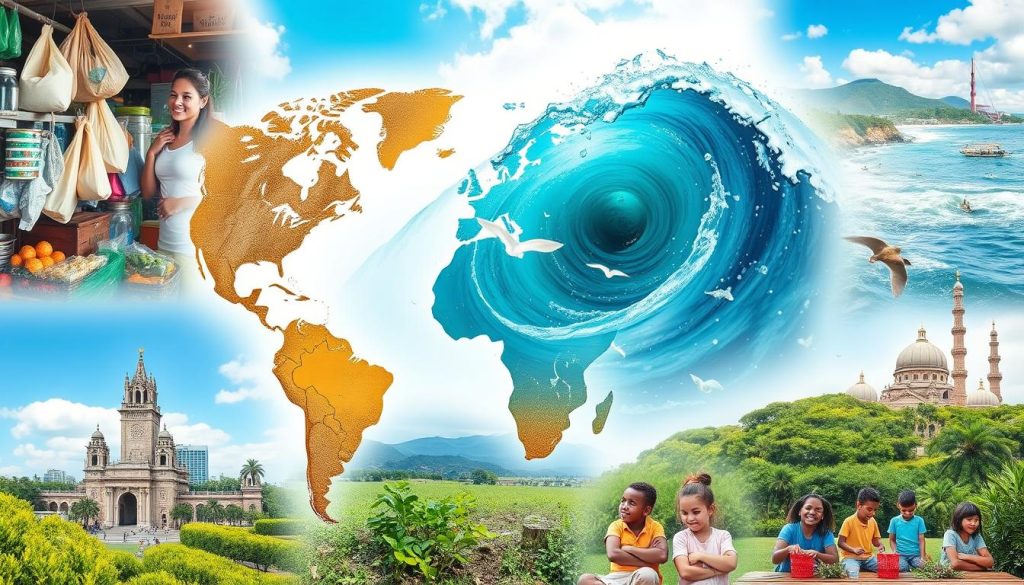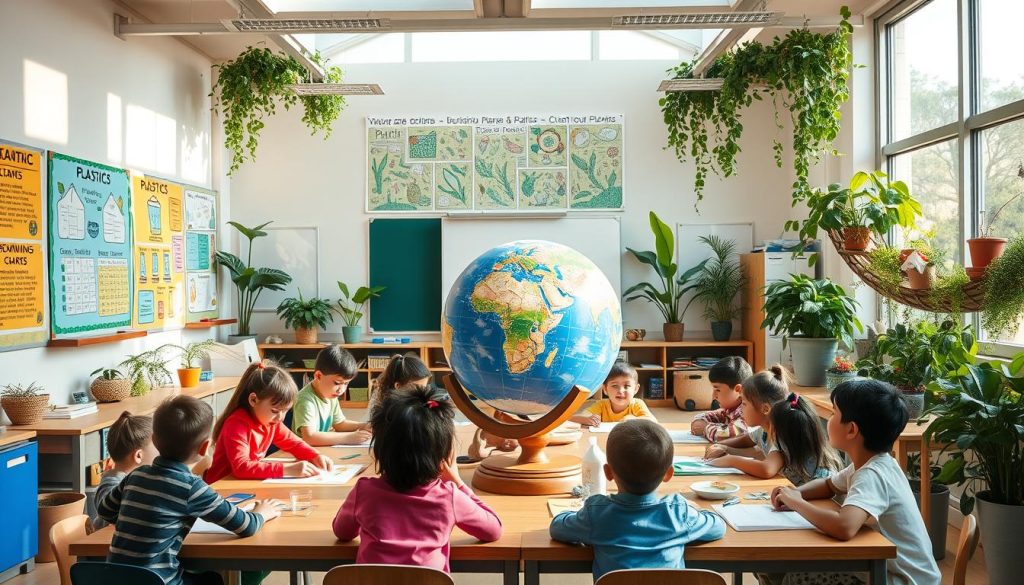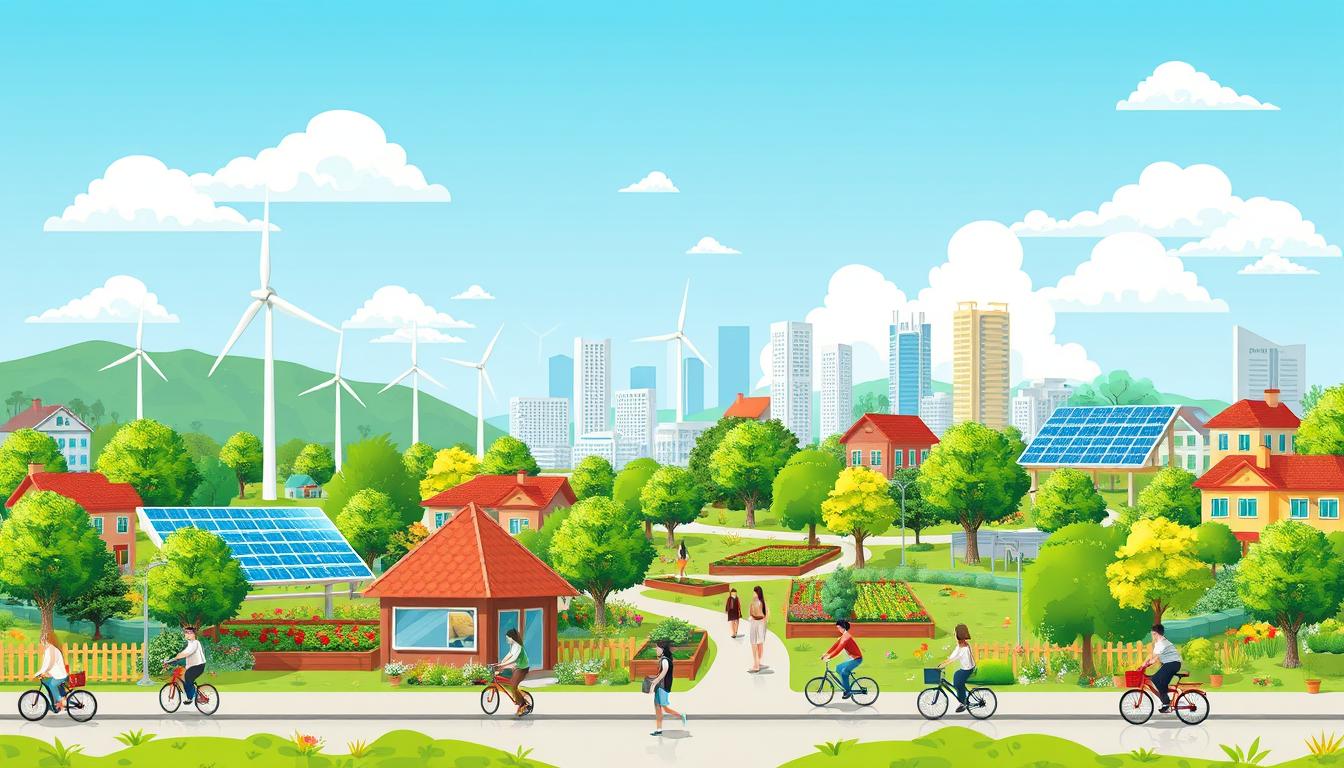The world is seeing more efforts to cut down on single-use plastics. This is because of the growing harm caused by plastic pollution. From big policies to small actions, we all need to help protect our environment.
We’re all working together to make a better future. By using less plastic and moving towards zero waste, we can keep our planet healthy. This is for the benefit of all future generations.
In this article, we’ll look at the global efforts to ban plastics. We’ll understand why these efforts are important, their history, and who is leading this change.
Understanding Plastic Ban Movements
Plastic ban movements are worldwide efforts to tackle the big problem of single-use plastics. More people are joining in because they see the need for living in a more sustainable way.
What Are Plastic Ban Movements?
These movements include laws and campaigns to cut down on single-use plastics. They often ban items like plastic bags, straws, and cutlery. It’s a big step to stop our oceans and wildlife from getting hurt by plastic.
By choosing to live more sustainably, we help protect our planet from getting worse.
The Importance of Reducing Plastic Waste
It’s key to keep our environment and health safe by reducing plastic waste. Single-use plastics fill up landfills and pollute our oceans. They also release harmful chemicals into the soil and water.
By joining plastic ban movements, we help make our planet healthier. We also encourage living in a way that’s better for our planet.
Key Players in the Movement
Many important people and groups are leading the fight against plastic waste. Activists like Greta Thunberg have made the world aware of the plastic problem. Groups like the Surfrider Foundation and Greenpeace work hard for plastic bans and clean-ups.
Also, it’s up to us, the consumers, to make eco-friendly choices. By doing so, we support policies that are good for our planet.
The History of Plastic Ban Initiatives
Exploring the history of plastic bans gives us insight into global environmental efforts. We see how grassroots groups have shaped laws and public views.
Timeline of Major Plastic Bans Worldwide
Key moments in the fight against plastic have marked our journey:
- 1988: Canada was among the first to ban plastic microbeads in personal care.
- 2002: Bangladesh banned lightweight plastic bags, inspiring others.
- 2014: California banned single-use plastic bags, a U.S. first.
- 2018: The European Parliament banned many single-use plastics, a big step for the EU.
- 2020: New York banned plastic bags, a major U.S. victory.
The Role of Grassroots Organizations
Grassroots groups have been crucial in pushing for plastic bans. They drive change through community action and environmental awareness. Groups like Greenpeace and Surfrider Foundation have changed public opinion and pushed for stricter plastic laws.
Policies and Legislation
Creating plastic ban laws is a complex task involving many players. These laws show a country’s commitment to the environment. Here are some examples:
| Country/Region | Major Legislation | Year |
|---|---|---|
| Canada | Microbead Ban | 2018 |
| European Union | Single-Use Plastics Directive | 2019 |
| Kenya | Plastic Bag Ban | 2017 |
| New York, USA | Plastic Bag Ban | 2020 |
| Rwanda | Plastic Bag Ban | 2008 |
The link between activism and policy-making shows the power of working together. As laws evolve, grassroots efforts remain key to a plastic-free future.
Success Stories from Around the World

Traveling the globe, we discover amazing stories of fighting plastic pollution. Countries and local governments are leading the way with new, green ideas. These stories teach us valuable lessons for our own planet.
Countries Leading the Charge
Some nations are at the forefront of the plastic battle. Rwanda is known as the “cleanest country in Africa” for banning plastics since 2008. The European Union is also making big moves, aiming to get rid of single-use plastics across its countries.
Local Governments Making an Impact
Local governments are just as important as national ones. Cities like San Francisco have set goals for zero waste. They work with the community and businesses to achieve this. In India, Maharashtra banned single-use plastics and raised awareness through strict rules and campaigns.
Notable Case Studies
| Location | Initiative | Outcome |
|---|---|---|
| Rwanda | National plastic bag ban | Significant reduction in plastic waste and pollution |
| European Union | EU single-use plastics directive | Gradual elimination of single-use plastics |
| San Francisco | Zero-waste policy | High recycling rates and reduced landfill waste |
| Maharashtra, India | Statewide single-use plastic ban | Increase in awareness and significant environmental conservation efforts |
The Role of Businesses in Plastic Ban Movements

Businesses are playing a big role in the fight against plastic waste. They are now serious about being environmentally responsible. Companies from different fields are working hard to use less plastic and adopt green practices.
Corporate Responsibility and Plastic Reduction
Big companies are leading the way in reducing plastic waste. Giants like The Coca-Cola Company and Unilever have promised to cut down on plastic and boost recycling. They are showing the way for smaller businesses to follow.
Innovations in Alternative Materials
Businesses are also investing in new, eco-friendly materials. They are creating products that are biodegradable or can be reused many times. For example, IKEA is designing products that use more renewable and recycled materials. This not only cuts down on plastic but also supports a sustainable economy.
Partnerships for Sustainability
Working together is key to reducing plastic waste. Companies like Starbucks are teaming up with groups like the World Wildlife Fund. These partnerships help make big changes for the better of our planet and economy.
In short, businesses are crucial in the battle against plastic pollution. By being responsible, using sustainable materials, and partnering up, they are helping make our world greener and more sustainable.
Overcoming Challenges in the Fight Against Plastic

The fight against plastic pollution faces many obstacles. Yet, we can overcome these challenges. Together, we can make a big difference in reducing plastic waste and creating change.
Resistance from Plastic Industries
Industry resistance is a big challenge in fighting plastic pollution. Many companies don’t want to change because of costs and logistics. They also fight against strict rules that could hurt their profits.
To beat plastic pollution resistance, we need to support policies that encourage green practices. We should offer incentives for companies to go sustainable.
Public Awareness and Education Campaigns
Public awareness and education are key in the fight against plastic waste. Teaching people about plastic pollution’s effects can lead to change. Successful campaigns use social media, events, and schools to spread their message.
These efforts are vital in raising a generation that values sustainability. They help people understand the importance of reducing plastic use.
Compliance and Enforcement Issues
Even with laws, making sure everyone follows them is hard. Many places lack the resources to enforce plastic bans. Working together is crucial to solve these problems.
Strengthening rules and making sure companies follow them is key. With strict enforcement, we can cut down plastic waste a lot.
The Importance of Consumer Involvement
Being active in consumer activism helps fight plastic pollution worldwide. By choosing wisely every day, I can make a big difference. Here are some ways I can help.
How I Can Make a Difference
My choices as a consumer can lead to big changes. By pushing for less plastic, I tell companies to use fewer harmful materials. Simple actions like using reusable bags and containers help a lot.
Refusing single-use plastics and joining local clean-ups also sends a strong message. Together, we can move towards a more sustainable future.
Reducing Personal Plastic Use
Starting small is key to using less plastic. I carry a reusable water bottle and use metal straws. I also avoid products with too much plastic.
These habits cut down my plastic use and inspire others. I also buy in bulk and choose items like bamboo or glass over plastic.
Supporting Sustainable Brands
Supporting eco-friendly brands is a powerful way to fight plastic waste. Companies like Patagonia and Seventh Generation lead with sustainable products. By buying from them, I help reduce plastic and encourage others to do the same.
In summary, fighting plastic waste is everyone’s responsibility. My actions in reducing plastic and backing eco-friendly brands can make a big difference. Together, we can bring about real change.
Future Trends in Plastic Reduction
Plastic pollution is a big problem worldwide. But, the future looks bright with new ways to tackle it. Let’s look at some key trends in plastic reduction that are coming.
What to Expect in Coming Years
Soon, we’ll see big steps towards reducing plastic. Governments, companies, and people will work together on new solutions. Laws will get stricter, making us all more aware and responsible.
Single-use plastics will be limited, pushing us towards reusable and green options. This change will be big.
Companies will focus more on being green, cutting down their plastic use. Also, there will be more education on why we need to use less plastic and adopt eco-friendly habits.
Advancements in Recycling Technology
New recycling tech will be key. New methods will make recycling better and more efficient. This means we can turn plastic waste into new products more easily.
For instance, enzymatic recycling could break down plastics better, helping the environment. These tech advances will help fight plastic waste worldwide.
Global Cooperation and Agreements
Global agreements are vital to fight plastic pollution. Countries working together through treaties will help reduce plastic waste. This will lead to more sustainable practices.
The Paris Agreement and the Basel Convention are already helping. By sharing knowledge and practices, countries can make a big difference. This will help our planet.
These efforts will include stricter rules, better recycling tech, and education for everyone. Global teamwork is essential to fight plastic waste and protect our environment.
Taking Action: My Role in the Movement
Understanding how I can help with the plastic ban movement is key. I need to get involved locally, advocate for environmental policies, and share eco-knowledge. These steps help reduce plastic waste and make our planet healthier.
Ways to Get Involved Locally
Starting to make a difference begins in my community. I can join local clean-up events and support businesses that use less plastic. I also encourage others to do the same. Being part of local environmental groups helps us work together.
Whether it’s cleaning up beaches or starting recycling programs, my actions can lead to big changes.
Advocacy and Policy Change
Advocacy is crucial for changing environmental policies. I need to stay updated on laws and support those that cut down plastic waste. Writing to my representatives, signing petitions, and attending public hearings are ways to make my voice heard.
Together, we can push for stricter plastic bans and support eco-friendly options.
Sharing Knowledge and Experiences
Sharing eco-knowledge is a powerful tool against plastic pollution. By teaching my loved ones and community about plastic waste, I inspire them to act. Sharing success stories and tips for using less plastic can motivate others to join the fight.
Through social media, workshops, and conversations, we can spread awareness and create change.
Every small action I take is important. By doing these things, I’m playing a big role in achieving a sustainable future.
